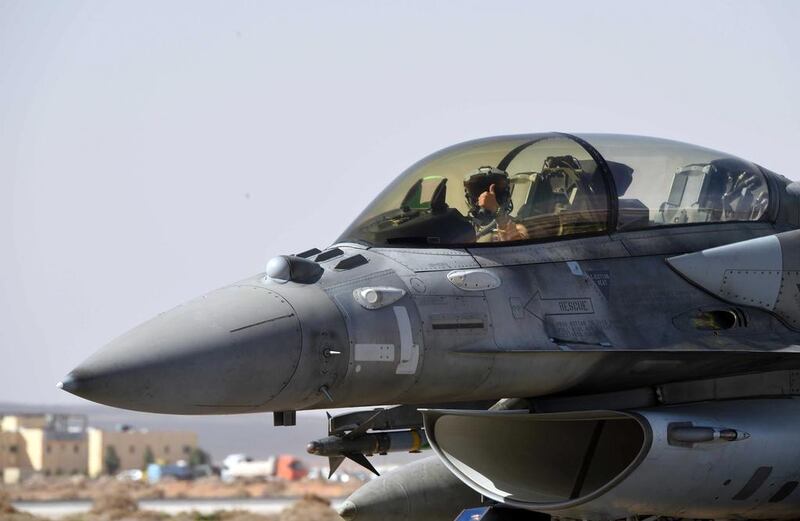NEW YORK // The UAE has conducted more air operations against ISIL extremists than any member of the international coalition aside from the United States, the US state department said on Friday in its annual report on global terrorism.
It did not give overall figures or explain whether the figure included only bombing sorties carried out by Emirati fighter jets, or other types of supporting air operations also.
The 2014 report on terrorism, which the US secretary of state is required to submit to congress, largely praised the UAE for its efforts to combat extremism both within its borders and in the region.
The government’s non-military efforts in particular, including choking off funding networks for terrorist groups and securing its borders, were singled out in the report.
“The UAE government has openly advocated fighting violent extremism not only militarily, but holistically, including by stopping violent extremist funding, disrupting the recruitment of foreign fighters, securing borders, preventing the exploitation of the web and social media, and by contesting the use of religious centres to promote hatred and violence,” the report said.
The report also lauded the UAE’s new Federal Law Number Nine, which was introduced in 2014 to address gaps in the monitoring and prosecuting of entities and individuals engaged in fundraising for extremists.
“Notably, the amendments codified in law the obligation of all covered entities to report suspicious transactions related to terrorism financing,” it said.
US officials have previously said that the UAE has made the most strides among Gulf countries in cutting off funding to extremists, and last year the two countries set up a joint regional financial counter-terrorism task force in the UAE.
But, the report said, “significant concerns” remain over “exploitation by illicit actors of money transmitters”, both informal hawalas as well as licensed exchanges.
“Operational capability constraints and political considerations sometimes prevented the UAE government from immediately freezing and confiscating terrorist assets” in the absence of assistance from the US or international law enforcement agencies, it added.
Other Gulf countries, Qatar and Kuwait in particular, have in the past faced US criticism for lax enforcement of financial counterterrorism, despite new legislation aimed at strengthening their capabilities. The latest report said Qatar had made strides but “capacity to address this issue remained an obstacle”, adding that “Qatari officials took enforcement steps against private financiers of terrorism and shared limited information on others” with the US.
The UAE’s trial of 15 individuals, including Emirati citizens, for supporting the Al Qaeda-affiliated Jabhat Al Nusra and Ahrar Al Sham in Syria was the first case to use provisions in a newly-introduced counterterrorism law, Federal Law Number Seven, “and the mixed verdict of convictions and acquittals shows discernment in the way that the laws were applied”, the report said.
“The case shows the ability of the UAE government to focus its investigative resources on rooting out networks, and to use conspiracy and aiding and abetting as prosecution theories in terrorism cases.”
The most significant challenge to the UAE’s efforts on counterterrorism and security is the limited human capacity, given that these positions are filled by Emiratis, who make up only 11 per cent of the population, the report added.
The UAE-hosted Hedayah counter-extremism centre and think tank was also praised, as was the US customs preclearance facility at Abu Dhabi airport, which is funded by the UAE.
Globally, terrorist attacks surged during 2014, with a third more attacks than the previous year and an 81 per cent increase in fatalities, the report said. There were 13,463 terrorist attacks, a 35 per cent jump from 2013, resulting in more than 32,700 deaths.
More than 9,400 people were kidnapped or taken hostage by militants, triple the rate of the previous year, it said.
The year was dominated by the rise of ISIL in Iraq and its spread to Africa and elsewhere, and the group’s challenge to Al Qaeda. Al Qaeda “appeared to lose momentum as the self-styled leader of a global movement in the face of ISIL’s rapid expansion and proclamation of a caliphate,” the report said.
While terrorist attacks increased in Iraq, Nigeria and Afghanistan, they decreased in Pakistan, a small dose of positive news in an otherwise dire report.
Meanwhile, more than 60 per cent of all attacks took place in five countries: Iraq, Pakistan, Afghanistan, India, and Nigeria.
tkhan@thenational.ae





